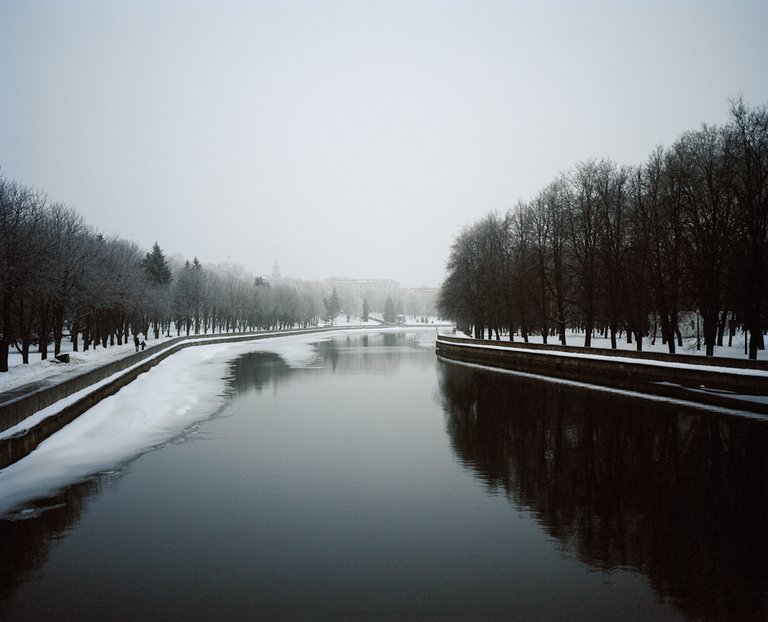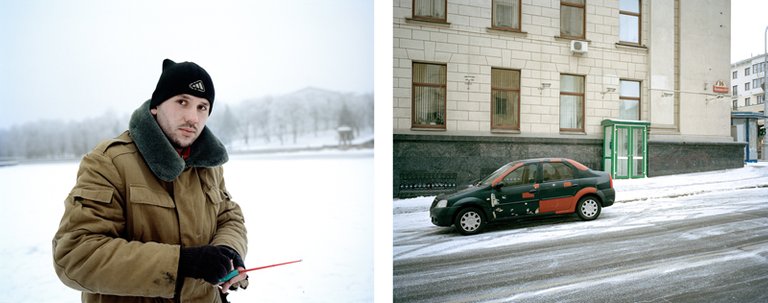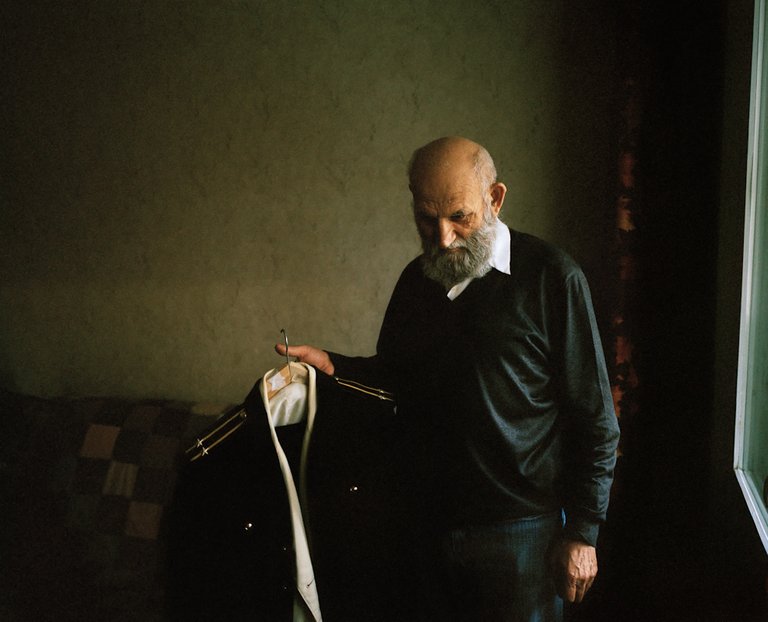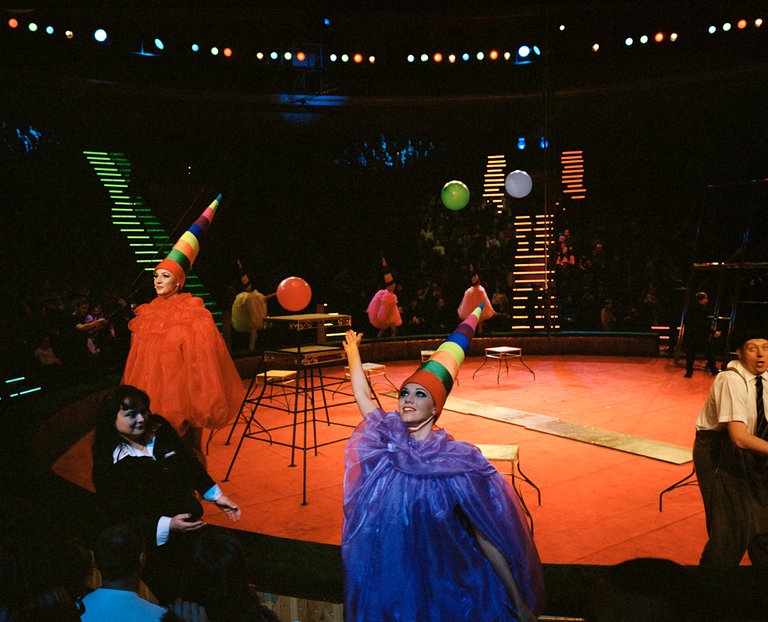After a period of mounting pressure from Western nations and intensified domestic opposition activity, Lukashenka’s Belarus has gradually fallen from the international news, leaving its society in a growing resignation to the spreading regime. An Uncertain Winter, a photo series by a young photographer Marco Kesseler, is a report from the capital of this “last dictatorship in Europe”, Minsk, which juxtaposes the veneer of public normality with the more open experiences behind closed doors. We briefly asked Marco about the project and his work.

Grzegorz Ostręga (workshopx): You are 24 years old but you have already produced impressive and coherent bodies of work, which is an exceptional thing among young photographers. How long have you been into photography and how did you start?
Marco Kesseler: Both my parents are artists so I was brought up with art and photography from a young age. But it was only later on as a teenager that I really began to appreciate the potential of photography to tell stories and highlight issues. Even then it was a slow progression to working in this way.
GO: I also have an impression that the topics you’re interested in are more mature than usually picked by emerging photographers; your projects seem to be focused exclusively on uneasy social and political issues. Is there any special reason for that?
MK: Its true, past personal projects have focused on more troubled issues, but I wouldn’t say that this is what I’m exclusively interested in. These projects came about in different ways but I am often driven to document stories, which are overlooked. With the work in Albania I had a strong personal connection to a family that are affected by a blood feud. This followed my interest in the Soviet legacy and how it affects countries socially, economically and politically, which I hope to continue documenting through a much wider body of work.

GO: So this is what brought you to Minsk…
MK: With the recent work from Belarus I felt that it was important to witness the political situation, but particularly to hear the accounts of ordinary people living under Lukashenka’s regime. Often the country is only the focus of western media in the run up to the presidential elections, so I wanted to show how life continues for the rest of the time as well as looking at smaller issues that contribute to the wider political situation, for example the fact that there are almost no independent radio stations accredited to transmit within the country.
GO: Was it difficult to stay and work there? How people reacted to you?
MK: My trip had to be planned to an extent, as I only had limited time with visas. Though I had specific places and things that I wanted to visit, with people it’s often much harder to arrange things if you’re not in the country and don’t speak Russian, so I was quite reliant on peoples generosity. Generally people wanted to tell their story and by meeting one person there would always be others that they suggest I visit, for these I would usually go with a translator, but most of the time I would go about the city by myself, that’s how I prefer to work. I was there for three weeks, which was enough to get a feel for the place but I would like to return again in the future to continue to document the story over time.

GO: The Uncertain Winter series is so well edited, complete tale, that it almost hurt when I had to pick only a few photographs from the whole collection you published on your website. Actually, I can say the same about all your projects. Where did you learn the story-telling art? Or maybe it’s a natural gift?
MK: Thanks that’s a great compliment! To be honest I’m pretty hopeless when it comes to editing work, I always have to get help from friends. I certainly wouldn’t say it is a natural gift and to me my work is far from perfect, but spending endless hours looking at other photographers’ works and books has helped massively over the past few years. Not so much to learn ‘how to take a good picture’ but more to understand how stories and photographs work in a specific context.
GO: Also the quality and pureness of your pictures stun me – the messages are clear, frames well composed and everything is just where it should be. Would you say it is already your own chosen style? Otherwise, what or who inspires you?
MK: I wouldn’t say that I’m consciously choosing my own style; I think that I am slowly developing it as I continue to take pictures. Having said that, my peers and favourite photographers are always going to inspire and influence the way that I work. These people change on a regular basis but at the moment I really like the work of Hin Chua, Mark Power, Danny Peschl and Theo Cottle.

GO: What equipment do you use and why?
MK: I shoot with a Mamiya 7 when I have time and money, then a Canon 5D mkII when I don’t.
GO: You are entering your photography career in difficult and uncertain times. Do you think there still is a future for young and emerging photographers these days?
MK: I think making a living from photography is certainly not easy and anyone expecting to make their fortune in it probably has the wrong values; for me the experiences you encounter are far more important. I think there is still money in photography, but you just can’t work with the same business model of 20 years ago. As a young photographer you have to be very adaptive, so I balance personal projects with more commercial work. This isn’t really related to documentary photography, but today I met someone that makes his living from photographing only one breed of dog – there is money, you just have to search for it.

Marco Kesseler (b.1989) is a young documentary photographer based in the UK, with a focus on long term, in depth studies relating to social and political issues. This has seen him travelling to The Balkans and the Middle East. In 2012 Marco graduated (BA) in Press & Editorial Photography from University College Falmouth. An Uncertain Winter series won him the first prize at the IdeasTap Photographic Awards 2013 and an internship with Magnum Photos.
photographs: Marco Kesseler
text: Grzegorz Ostrega for workshopx
We hope you have enjoyed this interview. Please upvote, comment or resteem it. You can also consider signing up to our newsletter and be first to read our future stories: https://www.workshopx.org